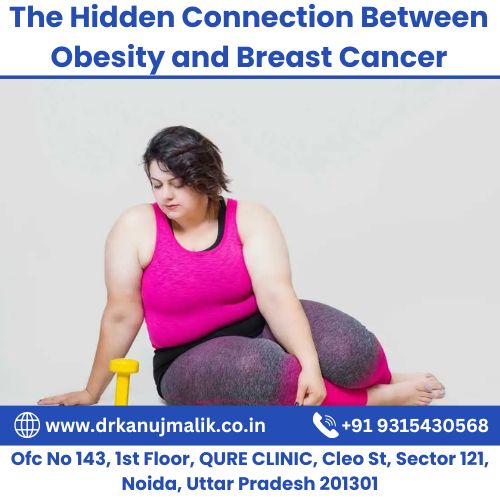Breast cancer is a major health concern worldwide, and its causes are complex and multifactorial. Among the various risk factors, obesity stands out as a significant, yet often overlooked, contributor to breast cancer.
While genetics and environmental factors are well-known, the impact of excess body weight is now being recognized as a key factor in the development and progression of breast cancer, especially in postmenopausal women.
Obesity and Its Impact on Breast Cancer
Obesity, defined as having a body mass index (BMI) of 30 or higher, has been closely linked to an increased risk of breast cancer. Fat cells produce oestrogen, a hormone that plays a key role in breast tissue development. However, excess oestrogen can stimulate the growth of oestrogen-dependent breast cancer cells.
For postmenopausal women, the ovaries stop producing oestrogen, and fat cells become the primary source of this hormone. This means that overweight or obese women often have higher levels of oestrogen, which can promote the development of oestrogen receptor-positive breast cancer.

Insulin Resistance and Tumour Growth
Obesity also leads to insulin resistance, where the body’s cells no longer respond to insulin effectively. This results in higher insulin levels, which can encourage the growth of cancer cells.
Elevated insulin levels also promote the production of growth factors like insulin-like growth factor (IGF), which further stimulates tumour growth.
Chronic Inflammation as a Cancer Contributor
Another mechanism linking obesity to breast cancer is chronic low-grade inflammation. Excess fat, particularly around the abdomen, secretes inflammatory cytokines, keeping the body in a constant state of low-level inflammation.
This inflammation damages normal cells and supports the growth of cancer cells, making it easier for tumours to develop.
Obesity and Breast Cancer Treatment
Obesity not only increases the risk of developing breast cancer but can also complicate treatment. Women who are obese are more likely to experience complications during surgery, chemotherapy, and radiation therapy.
Obesity can increase the risk of infections, wound healing issues, and cardiovascular complications during treatment.
Additionally, obese women may have altered drug metabolism, which can affect the effectiveness of treatments like chemotherapy and hormone therapy. For example, hormone therapies like tamoxifen, used to treat hormone-receptor-positive breast cancer, may be less effective in women with higher body fat.
Dr. Kanuj Malik: Expert Care for Breast Cancer Patients
Dr. Kanuj Malik is a highly experienced surgical oncologist with over 14 years of expertise in treating breast cancer. As a breast cancer specialist in Noida, Dr. Kanuj Malik offers a comprehensive approach to cancer treatment, combining surgery, chemotherapy, and lifestyle counselling to improve patient outcomes.
Dr. Kanuj Malik emphasizes the importance of early detection and preventive care, including managing obesity. His patient-centric approach ensures that each patient receives personalized care tailored to their needs, improving their chances of successful treatment and recovery.
Managing Obesity to Reduce Breast Cancer Risk
Managing obesity is crucial for reducing the risk of breast cancer. Regular physical activity is one of the most effective ways to control weight and reduce cancer risk. Exercise not only helps with weight management but also reduces insulin resistance and inflammation, two factors that contribute to cancer development.
In addition to exercise, a balanced diet rich in fruits, vegetables, whole grains, and lean proteins is essential for maintaining a healthy weight. Reducing the intake of processed foods, sugar, and unhealthy fats can also help lower cancer risk.
Losing just 5-10% of body weight can significantly reduce the risk of developing breast cancer, particularly in postmenopausal women.
The Importance of Professional Guidance
For those who are overweight, even modest weight loss can make a significant difference. Consulting with a healthcare professional, such as a breast cancer specialist in Noida, can provide valuable guidance on managing obesity and reducing cancer risk.
Dr. Kanuj Malik’s expertise in both cancer treatment and prevention ensures that patients receive comprehensive care that addresses all aspects of their health.
Conclusion
Obesity is a major risk factor for breast cancer, influencing not only its development but also treatment outcomes. By addressing obesity through lifestyle changes like regular exercise and a healthy diet, individuals can reduce their risk of breast cancer and improve their overall health.
Dr. Kanuj Malik, with his extensive experience in surgical oncology, provides expert care to patients battling breast cancer. His focus on both prevention and treatment makes him a trusted resource for anyone seeking to manage their cancer risk or navigate their treatment options.
If you are concerned about your breast cancer risk, don’t hesitate to consult Dr. Kanuj Malik, a dedicated breast cancer specialist in Noida, for the support and care you need.
Qure Clinic
Address – Shop No 143 1st floor, Cleo Street, near CLEO COUNTY, Sector 121, Noida, Uttar Pradesh, 201301
Email – kanujmalik03@rediff.com
Phone – +91 9315430568
Monday To Saturday – 9:00AM–9:00PM
Sunday closed
Google Map Location Listing – https://g.co/kgs/BfrTkmW
